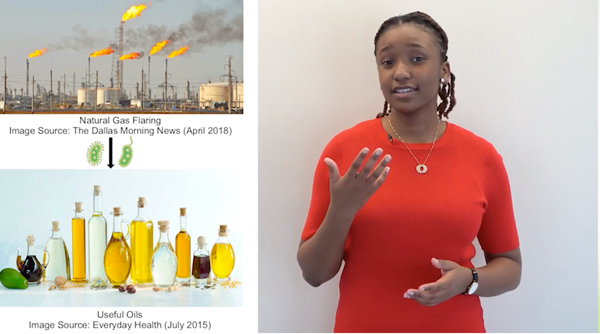University of Louisiana at Lafayette graduate student Angel Badewole is examining the economics of employing tiny methane-gobbling organisms to help convert the greenhouse gas into biofuels, pet food and pharmaceutical products.
In addition to her competency as a researcher, Badewole, who’s pursuing a master’s degree in chemical engineering, is pretty good at explaining her work.
The Council of Graduate Schools, for one, agrees. The nonprofit is the only organization in the U.S. dedicated solely to advancing graduate education and research. Badewole is among eight graduate students who earned opportunities to present research and participate in a roundtable discussion as part of the council’s 3MT Showcase and People's Choice Competition. The national competition will be held virtually on Thursday, Feb. 3.
Badewole’s spot in the event came last year, after she presented a video summary of her “Conversion of Methane to Useful Oils via Bacterial Digestion” master’s thesis during the regional 3MT competition. Students from 46 schools participated in the event. It was hosted by the Conference of Southern Graduate Schools. Badewole also won the UL Lafayette and the Louisiana Council of Graduate Schools 3MT competitions.
Dr. Mary Farmer-Kaiser, dean of UL Lafayette’s Graduate School, said Badewole’s performance underscores “her competency as a researcher and her ability to communicate effectively to a lay audience what her research is and why that research matters.”
“It’s the sort of skill set needed to become a leader in her field, because it indicates she has the ability to explain and influence, traits that are increasingly as important as being a strong researcher,” Farmer-Kaiser said.
Badewole is researching methanotrophic bacteria, or methanotrophs. The microscopic organisms consume methane as a source of carbon. They also possess what Badewole calls a “superhero ability to digest” methane, thanks to metabolisms that convert it into oils used to make a variety of products.
Methane is generated when organic material breaks down. It’s released into the Earth’s atmosphere in many ways, including when natural gas is produced, waste decomposes and plants decay. Methane is considered a harmful greenhouse gas, since it absorbs the sun’s heat and warms the atmosphere. That’s a key reason researchers are exploring scientific processes for using methanotrophs to help refineries, wastewater treatment facilities and landfills get rid of excess methane.
Badewole’s focus is the bottom line. She’s researching costs associated with growing methanotrophs and extracting their oils; she’s also analyzing how much money products made with those oils might generate. “I’m basically looking at the balance needed to make this process of redirecting waste methane that would otherwise go into the atmosphere into something useful and profitable,” she explained.
Her master’s thesis advisor Dr. Emmanuel Revellame, an assistant professor in the College of Engineering, predicts success for Badewole, who he says is “hardworking, resourceful, takes initiative, and has already proven to be an outstanding researcher.”
Badewole, who is from Nigeria, holds a bachelor’s degree in chemical engineering from the University of Maryland, Baltimore County. She envisions a career “taking waste and turning it into resources of value that positively impact our environment.”
“I’m interested in processes that show we’re thinking about the future, because I believe it’s important to operate in ways that are both mindful of sustainability and cost-effective,” Badewole explained.
Photo: Angel Badewole, a graduate student in UL Lafayette’s College of Engineering, is researching microscopic organisms that consume methane and convert the greenhouse gas into oils for biofuels, pet food and pharmaceutical products. She will present a video summary of her work during a Council of Graduate Schools national event on Thursday, Feb. 3. Submitted photo
